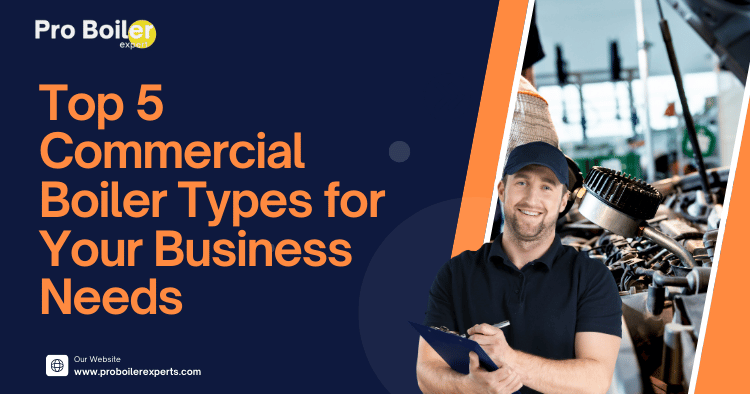Table of Contents
- Introduction
- 1. Fire-Tube Boilers
- 2. Water-Tube Boilers
- 3. Electric Boilers
- 4. Condensing Boilers
- 5. Biomass Boilers
- Conclusion
- FAQs
Introduction
Selecting the right commercial boiler is vital for meeting your business’s heating requirements efficiently and sustainably. As we move into 2024 and beyond, advancements in boiler technology and increased focus on eco-friendly solutions are influencing the choices available. In this article, we’ll explore the top five commercial boiler types, detailing their benefits, applications, and the most relevant information to help guide your decision.
“Choosing a boiler isn’t just about heat; it’s about efficiency, cost, and sustainability for your business.”
1. Fire-Tube Boilers

Fire-tube boilers are a staple in commercial heating, where hot gases from combustion pass through tubes surrounded by water. This design allows for efficient heat transfer and is widely used across various industries.
Key Features:
- Efficiency: Fire-tube boilers generally achieve efficiencies of around 80-85%. Recent models are being designed to improve efficiency further, potentially reaching higher levels by 2025.
- Low Maintenance: Their simple construction leads to lower maintenance requirements, an appealing factor for businesses looking to minimize operational costs.
- Scalability: These boilers can be easily scaled to meet increasing demands, making them suitable for growing businesses.
“Recent innovations are set to push the boundaries of efficiency, making these boilers even more appealing.”
Best Applications:
- Restaurants
- Hotels
- Manufacturing facilities
For more insights into fire-tube boilers, refer to this resource.
2. Water-Tube Boilers

Water-tube boilers circulate water inside tubes, exposing it to hot gases from combustion. This design offers greater flexibility and higher pressure capabilities compared to fire-tube boilers.
Key Features:
- Higher Efficiency: Water-tube boilers can achieve efficiencies exceeding 90%. As technology advances, newer models may push this figure even higher by 2025.
“Water-tube boilers exemplify modern engineering, providing both efficiency and adaptability.”
- Compact Size: Their design often allows for a more compact footprint, making them suitable for facilities with limited space.
- Adaptability: Water-tube boilers can rapidly adjust to fluctuating heat loads, providing stability in operations.
Best Applications:
- Power plants
- Large industrial facilities
- Hospitals
Explore more about water-tube boilers at this page.
3. Electric Boilers

Electric boilers use electricity to heat water, providing a clean and efficient solution without on-site emissions. Their popularity is rising, especially in areas where natural gas is scarce.
Key Features:
- Zero Emissions: Electric boilers produce no direct emissions, making them an environmentally friendly option.
“Going electric means a cleaner, quieter operation—perfect for sensitive environments.”
- Quiet Operation: They operate silently, which is beneficial for businesses in noise-sensitive environments.
- Low Installation Costs: Due to their straightforward setup, electric boilers often have lower installation costs compared to traditional fuel-based systems.
Best Applications:
- Small businesses
- Office buildings
- Residential setups
For further details about electric boilers, check out this informative article.
4. Condensing Boilers

Condensing boilers are designed to maximize energy efficiency by recovering and reusing heat that would otherwise escape through flue gases. They are among the most efficient options available today.
Key Features:
- High Efficiency: Condensing boilers can achieve efficiency ratings of over 95%, with emerging technologies expected to enhance these ratings even further by 2025.
“Condensing technology is revolutionizing the industry, offering businesses significant savings.”
- Reduced Energy Costs: Their efficiency translates to lower energy bills, significantly benefiting the operating costs of large facilities.
- Sustainability: Powered by natural gas, propane, or oil, these boilers often lead to lower carbon footprints compared to traditional systems.
Best Applications:
- Residential heating
- Large commercial buildings
- Industrial processes
Learn more about condensing boilers here.
5. Biomass Boilers

Biomass boilers utilize renewable organic materials, such as wood pellets or other agricultural wastes, as fuel. They are becoming increasingly popular as businesses seek sustainable heating solutions.
Key Features:
- Renewable Energy Source: Biomass is a sustainable resource, making this boiler type an eco-friendly choice.
“Sustainability is not just a trend; it’s an essential part of modern business practices.”
- Carbon Neutral: The CO2 emissions during combustion are offset by the CO2 absorbed during the growth of the biomass.
- Government Incentives: Many regions offer tax credits or incentives for installing biomass systems, enhancing their financial appeal.
Best Applications:
- Farms
- Eco-friendly businesses
- Educational institutions
For more information on biomass boilers, consult this resource.
Conclusion
Choosing the right commercial boiler is crucial for ensuring energy efficiency, cost-effectiveness, and sustainability in your business operations. By considering the various types available—fire-tube, water-tube, electric, condensing, and biomass—you can make an informed decision that aligns with your specific heating needs. Always consult with a professional to assess your requirements and explore the best options tailored to your business.
FAQs
What is the lifespan of a commercial boiler?
Commercial boilers typically last between 15 to 25 years, depending on maintenance and usage.
How do I determine the right size boiler for my business?
The right size depends on your heating needs, which can be calculated based on the square footage of the space, insulation, and climate. Consult with a professional for accurate sizing.
Can I switch from a gas boiler to an electric boiler?
Yes, switching from a gas boiler to an electric boiler is possible, but it may require adjustments to your electrical system. Consulting an HVAC technician is advisable.
Are there incentives for installing energy-efficient boilers?
Many governments offer tax incentives or rebates for energy-efficient installations. Check with local energy authorities for specific programs available in your area.
For more information, consider looking into the benefits of condensing boilers or biomass boilers. These resources can provide additional insights and help refine your commercial boiler choice.





